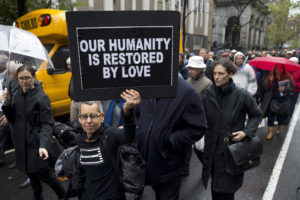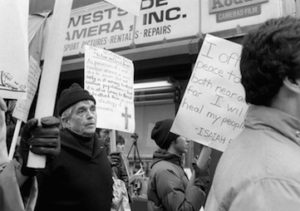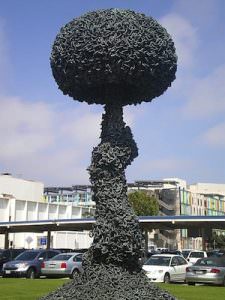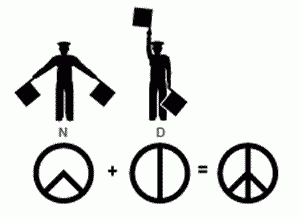Remembering the Rev. Daniel Berrigan, Jesuit Priest and Peace Activist
He was a man of the cloth and a man of letters, but most of all, Berrigan was a man of peace. He was also, as it happened, the man whom Kurt Vonnegut went so far as to call "Jesus as a poet."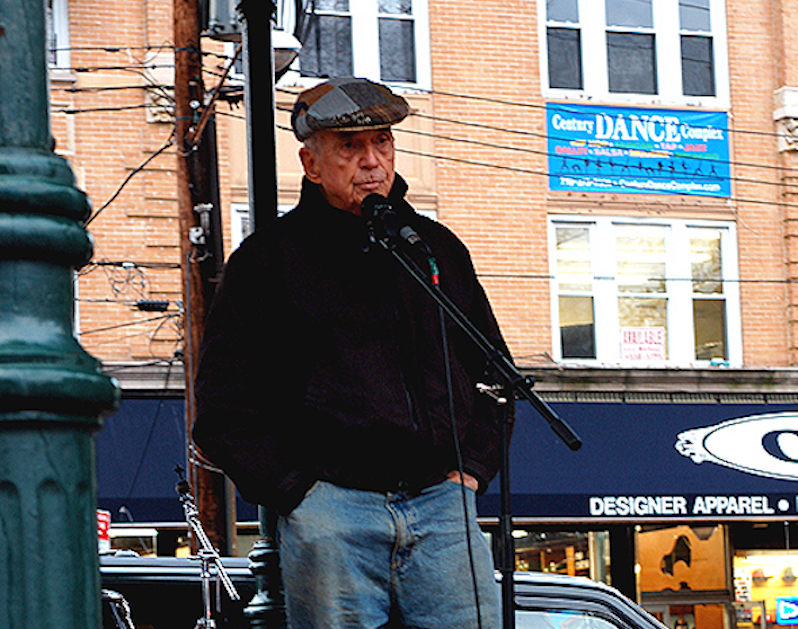 The Rev. Daniel Berrigan, an ardent opponent of the Vietnam War, in 2006. (Clara Sherley-Appel / Wikimedia Commons (CC-BY-SA)
The Rev. Daniel Berrigan, an ardent opponent of the Vietnam War, in 2006. (Clara Sherley-Appel / Wikimedia Commons (CC-BY-SA)
The Rev. Daniel Berrigan, an ardent opponent of the Vietnam War, in 2006. (Clara Sherley-Appel / Wikimedia Commons (CC-BY-SA)
He was a Jesuit priest, a man of the cloth and a man of letters—but most of all, the Rev. Daniel Berrigan was a man of peace. He was also, as it happened, the man whom Kurt Vonnegut went so far as to call “Jesus as a poet.”
Berrigan died Saturday at age 94, leaving as his legacy his poetry and prose, along with his life story, which reads as an object lesson on how to follow the Gospels to the letter without bending to the political tides that all too often have pressed his Catholic cohorts into submissive poses. Not so with Berrigan, who was known for his steadfastness and forcefulness, particularly with regard to his anti-war and anti-nuclear activism.
Here are some highlights from a laudatory obituary about Berrigan posted Saturday by “America: The National Catholic Review”:
Berrigan undoubtedly stands among the most influential American Jesuits of the past century, joining the likes of John Courtney Murray and Avery Dulles. Priest, poet, retreat master, teacher, peace activist, friend and mentor, he is the author of more than 50 books on Scripture, spirituality and resistance to war. …
A literary giant in his own right, Berrigan was best known for his dramatic acts of civil disobedience against the Vietnam War and nuclear weapons. He burned draft files with homemade napalm and later hammered on nuclear weapons to enact the Isaiah prophecy to “beat swords into plowshares.” His actions challenged Americans and Catholics to reexamine their relationship with the state and reject militarism. He constantly asked himself and others: What does the Gospel demand of us?
“For me, Father Daniel Berrigan is Jesus as a poet,” Kurt Vonnegut wrote. “If this be heresy, make the most of it.” …
In 1963, Berrigan embarked on a year of travel, spending time in France, Czechoslovakia, Hungary, Rome, South Africa and the Soviet Union. He encountered despair among French Jesuits related to the situation of Indochina, as the United States ramped up military involvement in Vietnam.
Berrigan returned home in 1964 convinced that the war in Vietnam “could only grow worse.” So he began, he later wrote, “as loudly as I could, to say ‘no’ to the war. … There would be simply no turning back.”
He co-founded the Catholic Peace Fellowship and the interfaith group Clergy and Laity Concerned about Vietnam, whose leaders included Martin Luther King Jr., Richard John Neuhaus and Abraham Joshua Heschel.
Berrigan regularly corresponded with Thomas Merton, Dorothy Day and William Stringfellow, among others. He also made annual trips to the Abbey of Gethsemani, Merton’s home, to give talks to the Trappist novices. …
A dramatic year of assassinations and protests that shook the conscience of America, 1968 also proved to be a watershed year for Berrigan. In February, he flew to Hanoi, North Vietnam, with the historian Howard Zinn and assisted in the release of three captured U.S. pilots. On their first night in Hanoi, they awoke to an air-raid siren and U.S. bombs and had to find shelter.
As the United States continued to escalate the war, Berrigan worried that conventional protests had little chance of influencing government policy. His brother, Philip, then a Josephite priest, had already taken a much greater risk: In October 1967, he broke into a draft board office in Baltimore and poured blood on the draft files.
Undeterred at the looming legal consequences, Philip planned another draft board action and invited his younger brother to join him. Daniel agreed.
On May 17, 1968, the Berrigan brothers joined seven other Catholic peace activists in Catonsville, Md., where they took several hundreds of draft files from the local draft board and set them on fire in a nearby parking lot, using homemade napalm. Napalm is a flammable liquid that was used extensively by the United States in Vietnam.
Berrigan spoke about that last episode—as well as the ensuing trial, in which he joined a group of defendants collectively called the “Catonsville Nine”—in a June 2010 PBS interview:
In May of ’68 we entered a draft board in this little town called Catonsville, in Maryland, and we took out about 160 A-1 files, we took them out of the building, downstairs, because we didn’t want to risk a fire in the building, and we hustled them into a parking lot nearby — they had these big trash baskets — and threw them in and set them on fire with homemade napalm. We had found the recipe for napalm in a special service handbook in the library at Georgetown U. None of us knew anything about napalm except that it had been used on people, especially on children. We thought that would be a proper symbol of the war as ethical outrage, that we would use this on documents that justified murder instead of on people, that that might speak to the public about this war. So the night before we had a kind of a liturgical service, we concocted napalm at the home of a friend in Baltimore and we mixed that and prayed over it, and prayed that this might be an instrument of peacemaking, as it was an instrument certainly of us taking our lives into our hands. And, uh, so we threw that over the huge bundle of papers and it whooshed up tellingly, and we joined hands around the fire and recited the Lord’s prayer, and waited for Armageddon.
Oh, they called the police of course, who arrived shortly and were astonished at these priests and people, and [they] put the fire out and hustled us into the wagon. And of course when we got to the … I think in the town they didn’t have any lock-up so they used the back room of a library and locked us in, and of course we were in a great state of relief. And then this big guy, I still can see the scene, appeared at the doorway, obviously in charge, you know, FBI, and he looked around the room and saw my brother, Philip, and he had been involved in Philip’s case in ’67 for pouring blood on draft files in Baltimore City. So he looked around the room and he bellowed out, “Berrigan again!” And then he yelled, “I’m leaving the Catholic church.” [Laughs.] So I said to Philip, “That’s the best thing you did all day — get him out!”
We knew we were going to be arrested, and we knew the chances were very large that we would spend several years in prison. That had to be spelled out, that had to be part of the preparation for this action, you know, so that people didn’t go into it blindfolded, or with some sort of utopian idea that we’re going to get away with this, which was ridiculous, infantile. So part of the building of the trust ahead of time was to take a close look at family obligations, at your professional life, at your bible, at your friendships, at your ability, as far as you can gauge it, to go into something that’s going to cost you, maybe years of your life. Well, that note of realism I think was very, very important. And some people were mature enough to say, “Okay, I can swallow, even though dry, and I can walk with you, even going to the unknown.” And then other people bowed out, which was a good thing to do also. [It was] too much.
Let me say something about the intention we had in the trial, which of course had to be dramatized in our style and in our rhetoric and our personal convictions, and so on and so forth. I think we had pretty well agreed ahead of time that going for acquittal was tactically hopeless, and wasn’t really speaking for our passion in going into Catonsville. The judge was always intervening, he played it very soft as the trial went on, because he knew he had the last word. But he was saying things to us like, “Well, if you had taken five or ten of those draft files and burned them symbolically, you wouldn’t be in this trouble now. But,” he said, “you did something very serious.” And we said, “Yes, and we understand it was serious.” We couldn’t really be impressed by a symbol that was not serious, and five or ten draft files as a symbol was not serious. So we took out 165, and that was worth three years, as we well know.
I tried in my statement before the court, I tried to speak about the criminality of burning papers instead of children. And that’s one way of putting our argument. We were calling these A-1 files ‘hunting licenses against humans,’ and we were saying if you carry this document, it’s open season on children and the aged and the ill and all sorts of people. And you could be given a medal for it, you certainly won’t be tried criminally for it. So we were trying to unlatch some of these myths that were protecting, in our way of thinking, were protecting mass murder. And putting it that way, that this napalm burned papers instead of children, was deliberately shocking and deliberately, as I felt, true. Why not put it that way, put it boldly?
You know, in a sense I think we flew in the face of something we respected very highly, which would be, let’s say Gandhian tactics. He often pled guilty to breaking the law … well, that’s another way of doing it. Gandhi is not my bible. Gandhi is a mentor in many, many arenas, but I can also respect him by disagreeing with him. And I think the idea of pleading very firmly “not guilty” and saying why — because it’s better to burn papers than children — that makes sense to me, even though maybe not Gandhian sense. [Chuckles.]
We frequently invoked, because all of us were people of religious faith, we frequently invoked the Sermon on the Mount. And what is one to make in wartime of this plain stipulation of Jesus, “Love your enemies,” or of a statement to Peter, “Put up your sword, those who live by the sword will die by the sword,” or his words at the Last Supper, “This is my body given for you,” not, “This is your body destroyed by me,” and so on, and so on, and so on. I mean, we have so much evidence that the burning of papers instead of children was a Christian act, a religious act, that war is constantly closing the book and saying it doesn’t apply. “We’re at war, hate your enemies.” “We’re at war — kill them!” As at present, and as during Vietnam. So, we were trying to keep the book open, and say, “No, we think he meant it, we think he meant it or he wouldn’t have said it. Love your enemies. Don’t kill, for any reason.”
Berrigan was found guilty at the trial of the Catonsville Nine, after which he became a fugitive from the FBI. He was later arrested and spent 18 months in prison.
In the video below, historian Howard Zinn reads one of Berrigan’s poems, “And the Risen Bread,” about homeless advocate Mitchell Snyder (via YouTube):
—Posted by Kasia Anderson
Your support matters…Independent journalism is under threat and overshadowed by heavily funded mainstream media.
You can help level the playing field. Become a member.
Your tax-deductible contribution keeps us digging beneath the headlines to give you thought-provoking, investigative reporting and analysis that unearths what's really happening- without compromise.
Give today to support our courageous, independent journalists.
